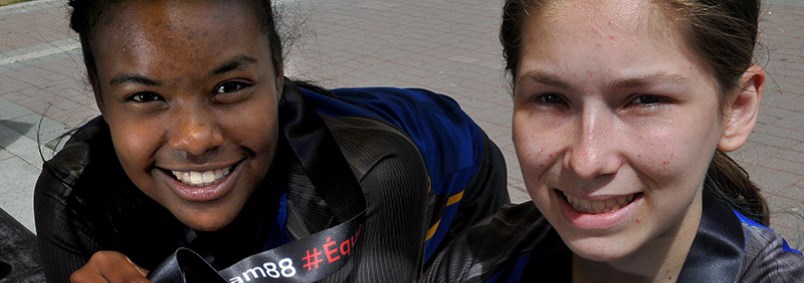A pair of Port Coquitlam soccer players are back from the 2017 North American Indigenous Games in Toronto with more than just gold medals. Aubrey Sparvier and Tahlaela Marks also have a new appreciation for their First Nations’ heritage and culture.
Sparvier, 15, helped BC’s female U15 team win their tournament while Marks, 16, played for BC’s championship U19 side.
And while the competition was lively, so were the drum circles and chants both girls experienced at the multi-sport event that brings together thousands of First Nations’ athletes from across North America every three years.
For Sparvier, the games provided an opportunity to connect with a part of her background that has felt a little remote. Her father, Larry, is from the Cowessess First Nation in Saskatchewan, but she has never had a chance to visit.
“For her to learn a bit more about the culture is good,” Larry said.
Marks, who’s always worn her Sechelt and Chehalis ancestry proudly, relished the opportunity to express her heritage freely.
“It definitely makes you feel proud,” said Marks, who wore some of her traditional regalia when she was away from the soccer pitch.
“I think she really stepped out of her element,” said her mom, Dawn. “She wasn’t holding back. She was like a blossoming flower.”
Both players said the level of support and camaraderie they felt at the soccer competition, which was played at McMaster University in Hamilton, was unlike anything they’d experienced playing league soccer in the Lower Mainland.
“We were all kind of like a big family,” Aubrey said. “It brought a bunch of people together in friendship.”
At the end of matches players cheered their rivals and when the tournament concluded, many swapped jerseys as well as email addresses.
Marks said she made new friends from other First Nations across the continent, which will give her a chance to learn more about their culture and traditions.
“It’s good to see other Indigenous things that go on, not just ours,” Marks said.
Aubrey said growing up in the city has sheltered her from some of the challenges faced by First Nations who live in rural reservations.
And developing that sense of kinship across all the First Nations is what the event is about, said Marks.
“You’re all Indigenous,” she said. “You’re all one.”



